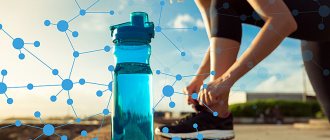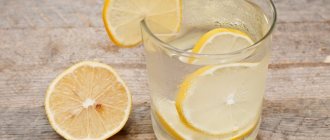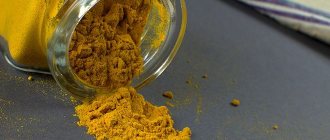How much water should a person drink per day?
Most human tissues and organs are 68-83% water. The exception is bones and fat, which contain 20-22% and 10-20% water, respectively (Table 1). Moreover, about 33% of water is contained inside the cells.
| Textile | % water |
| Fat | 10-20 |
| Skeleton (with bone marrow) | 20-22 |
| Cartilage | 55-60 |
| Liver | 68-70 |
| Leather | 72 |
| Brain | 70-75 |
| Muscles, spleen | 76 |
| Heart, lungs, pancreas | 78-79 |
| Kidneys | 83 |
| Blood (with cells) | 83 |
Table 1. Percentage of water in some human tissues and organs
At moderate temperatures, a healthy adult loses 3-4% of water per day. With a body weight of 80 kg, water loss with urine is 0.8-1.5 l, with exhaled air and then - 0.5-1.0 l, with feces - 0.1-0.2 l. During metabolism, the body produces 0.1-0.3 liters of water. The rest must be obtained from outside.
An adult needs to consume 30-40 ml of water per 1 kg of body weight . In children, the need for water is higher: up to 120 ml/kg body weight in newborns and up to 100 ml/kg body weight up to 7 years.
When calculating how much you need to drink, it is important to remember that about 30% of water enters the body with food, and this number is higher the more fresh vegetables and fruits a person eats. The body produces up to 300 ml of water per day. Therefore, a healthy adult weighing 75 kg should drink from 1.275 to 2.0 liters per day. This volume includes clean water and other drinks: tea, coffee, juices, soda, milk, kefir, mild alcohol. If your body weight is lower, your need for water is lower.
The long-awaited answer to the question: “How much water should an adult drink per day?”
During sports and physical activity, a person sweats. This is necessary to cool the body. With sweat, water and minerals are lost, mainly sodium. Their loss needs to be compensated, which means you need to drink more during physical activity.
What happens if you stop drinking water?
At the body level, dehydration leads to increased fatigue, dizziness, loss of appetite and headaches with a loss of 5-8% of water. In people who are more sensitive to fluid loss, these symptoms occur with a loss of 1-4% of water. A lack of 10% water causes serious problems with the brain and kidneys and seizures. A loss of 15-25% of water is considered fatal for humans.
Water is also necessary for the functioning of the kidneys, which remove metabolic products from the body - urea, ketone bodies, etc. If less than 0.6-0.8 liters of water enters the body per day, this process stops, and metabolic products poison the body. Long-term lack of water causes kidney failure.
What happens if you drink too much water?
Overhydration , or water poisoning, occurs when a person drinks too much water. Fatal poisoning occurs if you drink 3 liters of water in a few hours.

Jennifer Strange, 28, drank 6.5 liters of water in her bid to win the competition and win a Nintendo games console. The woman was indeed ahead of her rivals, but died as a result of water poisoning 5 hours later. Source - rbc.ru.
In less severe cases, excess water leads to swelling of the face, legs, arms and internal organs, including the brain and lungs, a decrease in body temperature, headaches, weakness and cramps. Excess water causes a decrease in the concentrations of potassium and sodium ions in the body - hypokalemia and hyponatremia. Potassium and sodium ions are necessary for the normal functioning of the nervous system and heart, therefore, with overhydration, consciousness is impaired and the heartbeat slows down.
If you drink too much water for a long time, chronic hyponatremia . It reduces coordination of movements, reaction speed and perception, and bones become fragile and break easily.
When should you drink water?
In a healthy person, water balance is maintained by the nervous and endocrine systems. When there is a lack of water, its excretion is reduced due to the hormones vasopressin and aldosterone. The blood thickens and the brain receives a signal that the person recognizes as thirst. With excess water, the production of thyroxine and parathyroid hormone increases. They stimulate the excretion of water by the kidneys.
During intense physical activity, especially in the heat, a person can lose up to 0.5 liters of sweat in 1 hour. This is necessary to protect the body from overheating. The feeling of thirst may be absent or go away when the mouth is moistened. As a result, a person does not feel that he does not have enough water, does not drink enough, and dehydration occurs. Older people may also not feel thirsty. Therefore, in the heat, during exercise, and for older people, it is important to monitor whether they drink enough water.

Bernard Gore, 71, who suffered from dementia, died of dehydration after getting lost in a shopping center and not drinking water for 3 days.
However, you should not drink more than necessary. Recommendations to drink 0.5 liters of water before and after training and another 0.1 liter every 30-40 minutes of training can lead to overhydration.
If your workout involves moderate exercise, you should drink a sip of water every 20-40 minutes when thirst occurs. During any training or exercise, you should not drink a lot of water at once. What this leads to can be seen at almost every marathon or half marathon, no matter where it takes place.
Sometimes a marathon runner drinks a glass of water during the competition and falls. This means he has hyponatremia, and possibly swelling of the brain or heart. Therefore, in the heat it is better to drink salted or mineral water, and during intense physical activity - isotonic water.
Drinking regimen for weight loss by the hour
You can determine exactly how to drink water throughout the day to lose weight using some rules. To do this, you need to think through a complete drinking routine:
- At 9 am you should drink 1 tbsp. warm water.
- At 11 o'clock - another 200 g of liquid.
- In 1 hour - at noon.
- At 2pm.
- 4 pm – 200 g.
- At 5 o'clock - again 1-2 tbsp.
- At 8 o'clock - another portion.
Note! To establish a drinking regime for yourself, you need to first establish a daily routine.
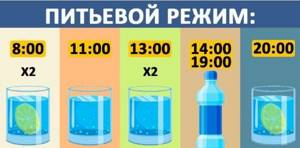
This schedule is approximate as rise times may vary. If there is physical activity in the schedule, then water consumption for just 1 workout increases to 1 liter per day.
The role of water in weight loss
Some diets suggest drinking 3 liters of water per day or not eating anything for 3 days, but only drinking water. Others - drink a glass of water before each meal in order to eat less - no matter whether you are thirsty or not. Still others limit their water consumption: for example, you can drink only from the morning until 17:00.
According to some studies, drinking water speeds up metabolism and helps break down fats, but their results are contradictory and you should not rely on them.
Most scientific studies published on PubMed and the Cochrane Library agree that replacing high-calorie drinks (juice, soda, alcohol) with water without changing other habits leads to an average weight loss of 5.15%. These studies mainly refer to short time periods - from 12 weeks to 12 months . Therefore, until new, longer-term studies appear, it cannot be said that water helps you lose weight in the long term.
The idea of drinking half a glass of water 10-30 minutes before meals to lose weight is logical. If there is already water in the stomach, less food will fit into it and the person will be full faster. Replacing high-calorie drinks with water will reduce your calorie intake and also help you lose weight. At the same time, you don’t need to drink when you don’t feel like it at all.
Pros and cons of drinking water for weight loss
Drink more, eat less
Drink water - don't drink sugary drinks - get fewer calories
If you need to lose 3-4 kg, you can drink water and not change other eating habits
You will definitely get enough water
It is unclear how permanent the weight loss will be
Replacing juices with water will not help you lose significant excess weight.
Drinking too much water will cause swelling
A significant lack of calories slows down your metabolism and makes it difficult to lose weight.
The relationship between water and weight
On the Internet you can find many articles on the relationship between water and weight loss. To a certain extent, drinking pure water does promote weight loss, largely due to the fact that it suppresses appetite. Very often, when we want to snack on something, our body is actually signaling the desire to drink. And drinking a mug of water will completely satisfy this desire, while eating a sandwich or other snack will bring with it new kilograms.
Many women are concerned about the question: how much water should you drink to lose weight? Experts believe that when losing weight, you need to increase your water consumption by 30% relative to the calculation. First of all, this is due to the fact that at the time of the breakdown of adipose tissue, there is an active release of toxins, which are removed from the body thanks to water. Also, when losing weight, girls often use protein diets, and water is also necessary for proper breakdown of protein.
What water is better to drink
First of all, drinking water must be safe: it must not contain toxic substances or disease-causing organisms and not cause illness if consumed for a long time. It is desirable that the water contains enough essential microelements, but their deficiency can be compensated for by food or nutritional supplements. And finally, it’s good if the water tastes good.
Warm water
Warm water and water at room temperature are quickly absorbed in the small intestine and better replenish fluid loss. Therefore, when dehydrated, it is better to drink water at ambient temperature or lukewarm. You can salt it - add 0.5 teaspoon of salt per liter of water. In most cases, rapid fluid replenishment is not critical, so it is not so important whether you drink warm or cold water .
Cold water
Cold water takes longer to be absorbed than warm water. This affects the feeling of fullness, so if you want to eat less, it is better to drink cold water . In addition, many people think it tastes better. If you drink about 0.5 liters or more of cold water in a short time, diarrhea will begin. This is not a sign of illness: the body simply removes the water that it does not have time to absorb.
Boiled water
Boiling kills harmful microorganisms in water, so it is safer than unboiled water. Boiling removes chlorine from tap water if it was there. The presence of gases in water, including oxygen, does not affect how well other substances dissolve in it. Statements that boiled water is “dead” and a “bad transport fluid” are pseudoscientific.
Tap water
Residents of Lipetsk, Tomsk, Tula, Elista and some other cities are lucky: their water pipes receive water from artesian wells. Such water is not disinfected, since it does not contain microorganisms dangerous to humans. You can drink it straight from the tap without boiling it, and it's delicious.
Most residents of Russia and the whole world receive water from open reservoirs. This water is filtered, purified from harmful impurities, disinfected and only then supplied to the water supply.
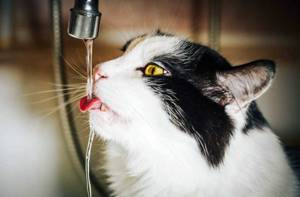
“Our sanitary standards and rules are much stricter than the requirements for drinking water in the European Union,” says Tatyana Sergeevna Kovyrshina, former head of the Mosvodokanal department. In most cases, tap water is indeed safe, but cities differ from city to city.
Since water in Russia is usually chlorinated, it should be boiled or filtered to get rid of chlorine and its smell. In addition, water pipes release small amounts of metals and minerals into the water. There are more of them in hot tap water, so you shouldn't drink it or use it for cooking. If the water smells strange or is colored, it may be dangerous even after filtering.
Filtered water
Tap water is filtered to remove chlorine and substances from pipes. A carbon filter is sufficient for this. Because filtration removes both harmful and essential substances from water, those who drink filtered water need to watch their diet to ensure they are getting enough minerals. They may also need toothpastes with fluoride, which is essential for tooth enamel.
Filtration does not eliminate microorganisms. On the contrary, many bacteria readily multiply on water filters, so they need to be changed promptly.
For travelers and residents of countries where access to safe water is difficult, special filter tubes are produced through which you can drink water from any source. The pore diameter in them is 0.01 microns, so the filter traps all microorganisms.
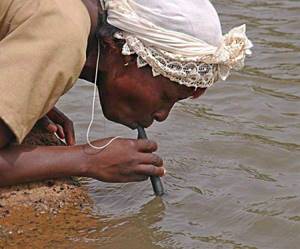
Personal filter tube for filtering and drinking contaminated/questionable water.
Such filters allow you to drink, and some models allow you to filter water for cooking. However, there are less minerals in filtered water than necessary. Therefore, those who use filter tubes on a hike need salt and, possibly, calcium supplements.
Bottled water
The quality of bottled water depends mainly on the conscience of the manufacturer. Some bottle tap water, some filter it. The best water is bottled from artesian wells, but its quality, taste and value depend on the composition of the water at the source.
As a rule, bottled water is safe , but exceptions are possible - most often due to deviations in the chemical composition of the water. This can be clarified by comparing drinking water ratings on several sites: for example, Roskachestvo and Roskontrol.

Rating of still bottled water on Roskoshchestvo.
Mineral water
Mineral water is usually considered as medicinal, but its beneficial effect on any diseases has not been proven. Most mineral waters contain a lot of sodium. Therefore, in case of dehydration, in the heat and when playing sports, mineral water will help replenish its losses through sweat.
Sodium intake is usually limited if you have kidney disease. Therefore, it is better not to drink mineral water with them. Carbonated mineral water quenches thirst no worse than non-carbonated water.
Distilled water
Distilled water contains neither microorganisms nor toxic substances. However, it does not contain essential minerals. Therefore, it is easier to get poisoned with distilled water than with regular water. Its long-term use leads to disruption of the nervous system and more frequent bone fractures .
Sea water
Water with a high salt content, in particular sea water, is hazardous to health. The same osmosis that causes the movement of distilled water into the cells when they come into contact with sea water leads to the removal of water from the cells towards a higher concentration of salts.
This means dehydration. Sea water puts additional stress on the kidneys, and they quickly stop working. It was dehydration and impaired kidney function that killed many sailors who were shipwrecked and left without fresh water.

In 1972, Douglas Robertson and his family were traveling on a yacht when they encountered an orca and were shipwrecked. After spending 38 days at sea on an inflatable life raft and a wooden boat, the Roberstons survived only by drinking sea turtle blood, fish eyes, and rainwater (all in an attempt to replace normal drinking water).
Drinking for athletes
Isotonic drinks - drinks for athletes - contain minerals.
They are necessary for those who are professionally involved in sports and train for 3-4 hours every day, since during physical activity a person loses minerals through sweat. Isotonic drinks are useful for dehydration. But in most situations, plain water is sufficient.
When can you take a risk?
Without determining how pure rainwater is, it is difficult to assess the advisability of using it for drinking. In areas remote from industrial facilities - for example, at recreation centers in the forest or farmsteads - you can consider this option for preparing food for farm animals. A person should drink liquid that falls with precipitation only in critical situations - when there is no access to well, tap water or any other clean water, otherwise the risks of poisoning will be much higher than the possible benefits.
Brief information about the article
| Living creatures need water to cool the body and allow biologically important chemical reactions to take place in it. |
| With normal water balance, the same amount of water enters the body per day as it is released. |
| Water balance and water consumption are surrounded by myths that often stem from ignorance of biology. |
| An adult needs 30-40 ml of water per 1 kg of body weight per day, and this volume takes into account all the water entering the body. |
| Drinking too little water can cause dehydration, overheating, and kidney problems. |
| If you drink too much, edema forms, the functioning of the nervous system is disrupted and water poisoning occurs - overhydration. |
| You need to drink water when you are thirsty. |
| In the heat or during heavy physical activity, you need to drink a lot of salted or mineral water or isotonic water. |
| Water helps you lose weight if you replace high-calorie drinks with it and if you drink it shortly before meals, but it is unknown whether this is a long-term weight loss. |
| It is safe to drink artesian, bottled, boiled or filtered tap water. |
| It is dangerous to drink distilled and sea water and water from open sources. |
SYMPTOMS OF DEHYDRATION

When the body does not receive the required amount of water, almost all systems malfunction. Metabolism deteriorates, toxins are not completely eliminated and accumulate in the body. The result is headache, fatigue, and excess weight.
Lack of water can also negatively affect the nervous system. This is manifested by bad mood, insomnia and even depression. Lack of fluid also affects beauty. Hair becomes dry, splits, grows slowly, nails peel, break, skin becomes gray and uneven.
How much water to drink - answers to questions
When I wake up, I'm very thirsty. Is it necessary to drink water in the morning?
An adult ideally sleeps 7.5–9 hours and does not drink during this time. At the same time, the kidneys continue to work. In addition, water is released from the body through sweat and breathing. Therefore, after waking up, most people feel thirsty, and this is not a disease. To replenish fluid loss during sleep, you should drink something in the morning. Whether it is pure water, coffee, tea or juice depends on personal preference
How to calculate how many glasses of water an adult should drink per day?
You can calculate how many liters of water a healthy adult needs to drink per day using the formula: V = 0.035×m – 0.3(0.035×m)
m here is the human body weight in kilograms, 0.035 is the average human need for water (35 ml/kg body weight), V is the volume of water in liters.
Since 30% of water enters the body with food, this volume must be subtracted from the daily requirement.
To get the number of glasses of water you need to drink per day, divide the volume of water calculated using this formula by the volume of the glass. Typically a glass holds 0.25 liters of water, but some glasses are larger.
So does water work for weight loss or not?
Water helps you lose weight in two cases: if you replace all high-calorie drinks with water and if you drink water shortly before meals. This way a person consumes less calories and food, and therefore loses weight. The advertised “thermogenic effect of water” (supposedly negative calorie content) and the acceleration of metabolism under the influence of water have no scientific evidence, and you should not rely on them.
Why does an adult need to drink less water per kilogram of body weight than a child?
Children have a faster metabolism, and this affects water consumption. In addition, the ratio of volume to body surface area is smaller in children. This means that the baby becomes hypothermic, overheats, and loses water faster. Therefore, children's daily need for water is higher than that of adults.
What diseases does hydrotherapy help with?
Hydrotherapy, or hydrotherapy - treatment using water procedures - is an alternative medicine. There is no evidence that it helps with any disease. The same applies to treatment with mineral waters: it has not been proven that drinking them or administering them in any other way is effective for any diseases other than dehydration. It is necessary to distinguish swimming and exercise in the pool from hydrotherapy. In water it is difficult to make sudden movements that could damage your joints or spine. Therefore, exercise in the pool is recommended for rehabilitation after injuries, as well as for overweight people and pregnant women.
What is the normal water content in the human body?
In men – 58±8%, in women – 48±6% by weight. Interestingly, overweight people have lower body water content - about 45%. However, these are average values. The water content in the human body depends on age, gender, personal characteristics and method of analysis.
References
- Sophie C Killer, Andrew K Blannin, Asker E Jeukendrup. No evidence of dehydration with moderate daily coffee intake: a counterbalanced cross-over study in a free-living population. PLoS One. 2014 Jan 9;9(1):e84154. doi: 10.1371/journal.pone.0084154. eCollection 2014.
- David Jiménez-Pavón, Mónica Sofía Cervantes-Borunda, Ligia Esperanza Díaz, Ascensión Marcos, and Manuel J. Castillo. Effects of a moderate intake of beer on markers of hydration after exercise in the heat: a crossover study. J Int Soc Sports Nutr. 2015; 12: 26. Published online 2015 Jun 6. doi: 10.1186/s12970-015-0088-5
- Guillermo Bracamontes-Castelo, Montserrat Bacardí-Gascón, Arturo Jiménez Cruz. Effect of water consumption on weight loss: a systematic review. Nutr Hosp. 2021 Dec 26;36(6):1424-1429. doi: 10.20960/nh.02746.
- Jodi D Stookey, Florence Constant, Barry M Popkin, Christopher D Gardner. Drinking water is associated with weight loss in overweight dieting women independent of diet and activity. Obesity (Silver Spring) 2008 Nov;16(11):2481-8. doi: 10.1038/oby.2008.409. Epub 2008 Sep 11.
- Arthur J Siegel. Fatal water intoxication and cardiac arrest in runners during marathons: prevention and treatment based on validated clinical paradigms Am J Med . 2015 Oct;128(10):1070-5. doi: 10.1016/j.amjmed.2015.03.031. Epub 2015 Apr 22.
Subscribe to our channel on Telegram
to receive the latest articles in a timely manner!




